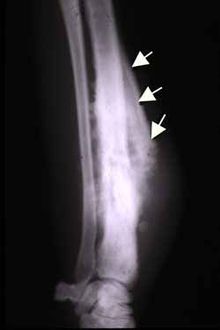
The Codman triangle (previously referred to as Codman's triangle) is the triangular area of new subperiosteal bone that is created when a lesion, often a tumor, raises the periosteum away from the bone. A Codman triangle is not actually a full triangle. Instead, it is often a pseudotriangle on radiographic findings, with ossification on the original bone and one additional side of the triangle, which forms a two sided triangle with one open side. This two sided appearance is generated due to a tumor (or growth) that is growing at a rate which is faster than the periosteum can grow or expand, so instead of dimpling, the periosteum tears away and provides ossification on the second edge of the triangle. The advancing tumour displaces the periosteum away from the bone medulla. The displaced and now lateral periosteum attempts to regenerate underlying bone. This describes a periosteal reaction.
The main causes for this sign are osteosarcoma, Ewing's sarcoma, eumycetoma, and a subperiosteal abscess.
References
- "Codman's triangle - General Practice notebook". gpnotebook.com. January 2018. Archived from the original on 2022-10-26. Retrieved 2022-10-26.
- "Periosteal Reaction". UW Radiology. Archived from the original on 2022-10-26. Retrieved 2022-10-26.
- Shapeero LG, Vanel D, Sundaram M, Ackerman LV, Wuisman P, Bauer TW, Neuenschwander S, Contesso G, Janney C, McDonald DJ (1994). "Periosteal Ewing sarcoma". Radiology. 191: 825–31. doi:10.1148/radiology.191.3.8184073. PMID 8184073.
- Hide, Geoff (April 19, 2018). "Imaging in Classic Osteosarcoma: Practice Essentials, Radiography, Computed Tomography". Medscape. Archived from the original on October 26, 2022. Retrieved October 26, 2022.
| Musculoskeletal examination | |||||||||
|---|---|---|---|---|---|---|---|---|---|
| Leg |
| ||||||||
| Arm |
| ||||||||
| Spine |
| ||||||||
| Other | |||||||||
This article about orthopedic surgery is a stub. You can help Misplaced Pages by expanding it. |